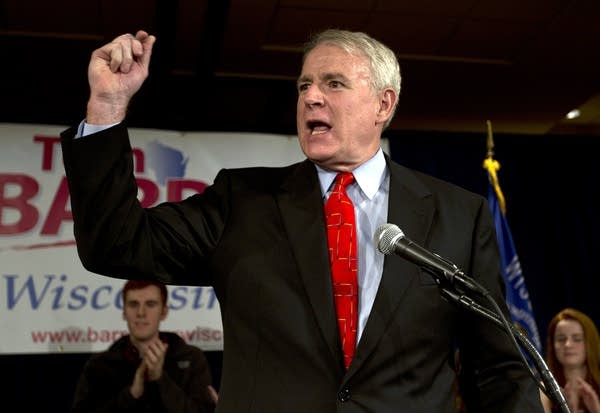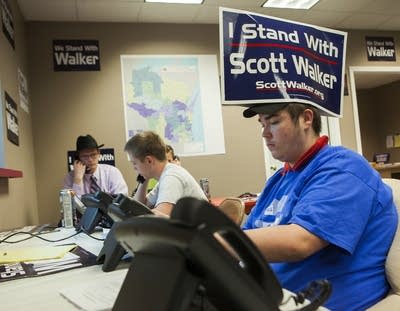Wis. recall 'just a question of how many people vote'
Go Deeper.
Create an account or log in to save stories.
Like this?
Thanks for liking this story! We have added it to a list of your favorite stories.

Months of campaigning to recall Wisconsin Gov. Scott Walker comes to an end today, as voters prepare to head to the polls Tuesday to decide whether to unseat a mid-term governor for the third time in the nation's history.
Recent polling shows the Republican governor leading his Democratic rival, Milwaukee Mayor Tom Barrett by several points. Millions of dollars have poured into Wisconsin during the campaign, and with very few undecided voters, much of the focus has been on voter turnout.
Voters mobilized to recall Walker after he pushed for legislation that weakened collective bargaining rights for state employees. That triggered months of protests at the State Capitol.
Political scientist Neil Kraus, a professor at the University of Wisconsin-River Falls, discussed the historic recall campaign with MPR's Cathy Wurzer on Monday. He said the Barrett campaign has likely suffered from voter fatigue. Wisconsinites have been bombarded with months of non-stop political advertising.
Turn Up Your Support
MPR News helps you turn down the noise and build shared understanding. Turn up your support for this public resource and keep trusted journalism accessible to all.
"I think a lot of folks are quite honestly just exhausted at this point," Kraus said. "I would argue that if the recall were several months ago, that the results might well be different."
An edited transcript of Wurzer's interview with Kraus is below.
Cathy Wurzer: Most polls, as you know, show Gov. Walker leading Tom Barrett. There was the recent Public Policy Polling poll just released. It shows Walker up over Barrett 50-47, but Public Policy Polling is a Democratic-leaning firm. What's the strategy for each candidate leading into tomorrow with very few undecideds in this race?

Neil Kraus: Well, I think for Mayor Barrett the strategy is really to maximize turnout, and it seems as if, in the last couple days, with absentee voting, early voting, and so forth, it definitely works to Barrett's advantage. I think for the governor, probably his strategy is just to stay on the message that he's been on, because as you indicated a moment ago, he is still ahead in just about all the polls.
Wurzer: How is this playing out in your neck of the woods there in western Wisconsin on campus? Was there an effort to get students to vote absentee before they left for the summer?
Kraus: There were some efforts at that. In some ways, it didn't seem quite as intense as the activity last summer with the Senate recalls, but there was still various organizations and folks in town and so forth that were trying to get students to tune in so they would know that they had to vote, or they could vote, anyway, absentee before the end of the semester.
Wurzer: You mentioned last summer, and there was an awful lot of attention. Do you think that there's some voter fatigue around this whole issue?
Kraus: I do. It's been a year-and-a-half, and I think a lot of folks are quite honestly just exhausted at this point. I would argue that if the recall were several months ago, that the results might well be different, but I think a lot of people, really on both sides, and even more so maybe people that are not firmly committed, are kind of tired at this point and want this to be done with.
Wurzer: I'm curious to ask this. Have you run into anybody who's not firmly committed? It seems like everyone's either in one camp or the other, very few undecideds in this race.
Kraus: I don't think I have, at least nobody who has said that to me. I've certainly talked to a lot of folks who are committed but still want it to be done and want to vote and get over, sort of get over the hump here. The polls indicate very small percentages of people who are undecided. My hunch would be that a lot of those folks are probably not going to vote tomorrow, but again we're talking 2, 3, 4 percent or something.
Wurzer: The president was in Minnesota on Friday. He seems to be staying out of the recall race. What do you make of that?
Kraus: Well, I know a lot of Democrats are very upset about that. I'm really not too surprised, in terms of strategy. I think that the president probably reasons that there's not enough of an upside for him to get involved in Wisconsin. I think very early on, and this was months ago, over a year ago, I think, he issued a statement or two supporting collective bargaining and that sort of thing, but beyond that, he really hasn't done too much.
Wurzer: The issue of collective bargaining, if you read some of the breakouts of the polls, seems to be kind of fading a little bit among voters. What seems to be driving voter interest? What issue are some of the voters coalescing around?
Kraus: I think that the general sort of tone of political debate in Wisconsin is quite a lot of this campaign right now, and Barrett's trying to really emphasize that, just the notion that things have become so hostile in many ways.
He's trying to argue that if he were elected tomorrow that basically he'd be able to work with all different groups, including Republicans and so forth, and try to sort of bring things back together. Collective bargaining has softened a little bit, but I don't think that, regardless of what happens tomorrow, I don't think that the long-term issue is really settled. I think that that's going to be kind of lurking for quite some time.
Wurzer: Does the issue that some of Gov. Scott Walker's former aides, they're tied up in this legal mess, does that have any legs at all to voters?
Kraus: That's a good point. I don't know. I look at the same polls that everybody else does, and it doesn't seem as if that is really catching on. I'm a little surprised by that because even though the governor certainly has not been charged with anything, several people around him have been, and there's also this ongoing investigation, the details of which we don't really know. And typically, any incumbent politician who's under any sort of cloud of any investigation is hurt by that, at least a little bit. It doesn't appear right now as if that has happened. Why that's the case, I don't really know. I think that's anybody's guess.
Wurzer: As a political scientist, I know you'll be keeping a close eye on tomorrow's results. What are you going to be watching for specifically? Any areas of the state specifically you're going to be watching for?
Kraus: I think the state partisan affiliations are pretty well entrenched, in terms of different regions, and obviously the larger cities vote heavily Democratic. President Clinton was campaigning for Mayor Barrett the other day in Milwaukee. I think turnout in Milwaukee and Madison and some of the smaller cities will be something interesting to look at. If Barrett does have a good chance, then he's going to have to maximize turnout there. Beyond that, the turnout question I think is the big thing, and in rural areas, in smaller communities, and much of the western part of the state and the northern part of the state, the governor is heavily favored, and I'm sure he'll win in those areas. It's just a question of how many people vote.
(Interview edited and transcribed by MPR reporter Madeleine Baran)




